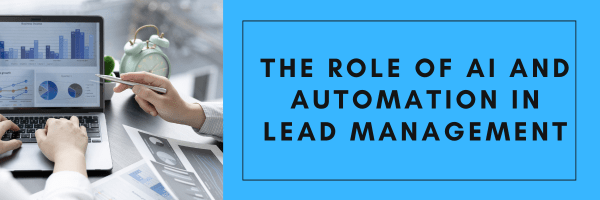In today’s digital age, where businesses face increasing competition and the need to effectively manage leads, the role of AI (Artificial Intelligence) and automation in lead management has become crucial. This article explores the various ways in which AI and automation can significantly impact lead management processes, improve efficiency, and drive better business outcomes.
1. Introduction
Lead management refers to the process of capturing, tracking, nurturing, and converting potential customers or leads into actual sales. It involves a series of activities aimed at engaging prospects, understanding their needs, and guiding them through the sales funnel. AI and automation technologies offer valuable tools and capabilities that can greatly enhance lead management efforts.
2. What is Lead Management?
Before delving into the role of AI and automation, let’s first define lead management. It encompasses various stages, including lead generation, lead qualification, lead nurturing, and lead conversion. Effective lead management ensures that businesses are able to prioritize and focus their resources on the most promising leads, leading to higher conversion rates and improved ROI.
3. The Importance of Lead Management
3.1 Effective Lead Generation
AI and automation can play a significant role in generating high-quality leads. Through intelligent data analysis and machine learning algorithms, businesses can identify patterns and behaviors that indicate potential leads. This allows for targeted marketing campaigns, increasing the chances of attracting qualified prospects.
3.2 Efficient Lead Nurturing
Once leads are captured, nurturing becomes essential to build relationships and guide prospects through the buyer’s journey. AI-powered automation tools enable businesses to deliver personalized content and recommendations based on individual preferences and behaviors. This personalized approach enhances engagement and increases the likelihood of conversion.
3.3 Improved Lead Conversion
AI can contribute to better lead conversion rates by automating lead scoring processes. By analyzing various data points and assigning scores based on predefined criteria, businesses can focus their attention on leads with the highest likelihood of conversion. This ensures that sales teams invest their time and effort in the most valuable prospects, maximizing the efficiency of the sales process.
4. The Role of AI in Lead Management
4.1 Automated Lead Scoring
AI algorithms can analyze lead data and assign scores based on factors such as demographics, online behavior, and engagement history. By automating the lead scoring process, businesses can quickly identify hot leads and prioritize their follow-up efforts accordingly.
4.2 Personalized Lead Engagement
AI-powered chatbots and virtual assistants can provide personalized interactions with leads, addressing their specific needs and inquiries in real-time. This automated lead engagement not only saves time but also ensures consistency in messaging and reduces the chances of human error.
4.3 Predictive Lead Analytics
AI algorithms can analyze large volumes of data to identify patterns and trends that can predict future lead behavior. This enables businesses to anticipate customer needs, personalize their approach, and proactively engage with leads, ultimately improving conversion rates.
5. Automation in Lead Management
5.1 Streamlining Lead Capture
Automation tools can streamline the lead capture process by automatically collecting and organizing lead information from various sources, such as website forms, social media, and landing pages. This eliminates the need for manual data entry, reduces errors, and enables faster lead follow-up.
5.2 Automating Lead Qualification
AI-powered automation can help businesses qualify leads more efficiently by applying predefined criteria and rules. This ensures that only qualified leads are passed on to the sales team, saving valuable time and resources.
5.3 Enhancing Lead Follow-up
Automation enables timely and consistent lead follow-up through personalized email sequences, notifications, and reminders. This ensures that no leads fall through the cracks and that each prospect receives the necessary attention, leading to higher conversion rates.
6. Benefits of AI and Automation in Lead Management
6.1 Increased Efficiency and Productivity
By automating repetitive tasks and leveraging AI capabilities, businesses can significantly improve the efficiency and productivity of their lead management processes. Sales and marketing teams can focus on high-value activities, resulting in better outcomes and higher revenue generation.
6.2 Enhanced Lead Quality
AI-powered lead scoring and qualification processes ensure that only the most promising leads are pursued. This leads to higher-quality interactions, better alignment between sales and marketing teams, and increased conversion rates.
6.3 Better Sales and Marketing Alignment
AI and automation bridge the gap between sales and marketing departments by providing a shared platform for lead management. This alignment enables smoother handoffs, better collaboration, and a more cohesive approach to generating and converting leads.
7. Challenges and Considerations
7.1 Data Accuracy and Privacy
While AI and automation offer numerous benefits, ensuring the accuracy and privacy of data is essential. Businesses must implement proper data governance practices and adhere to relevant regulations to maintain data integrity and protect customer information.
7.2 Integration and Implementation
Integrating AI and automation tools with existing systems and processes can be challenging. Businesses need to carefully plan and execute the implementation to ensure seamless integration and minimize disruption to ongoing operations.
7.3 Balancing Automation and Human Touch
While automation brings efficiency, it’s important to strike a balance between automated interactions and human touchpoints. Maintaining a personalized and human-centric approach is crucial to building trust and establishing meaningful connections with leads.
8. Best Practices for Implementing AI and Automation in Lead Management
8.1 Define Clear Objectives and Metrics
Before implementing AI and automation, businesses should clearly define their objectives and key performance indicators (KPIs). This ensures that the chosen tools and strategies align with the desired outcomes and enable effective measurement of success.
8.2 Choose the Right AI and Automation Tools
With numerous AI and automation solutions available, it’s important to choose the ones that best fit the business’s requirements and goals. Thoroughly evaluate different options, considering factors such as functionality, ease of use, scalability, and integration capabilities.
8.3 Monitor and Optimize Performance
Continuously monitor and analyze the performance of AI and automation systems. Regularly review key metrics, gather feedback from teams, and make necessary adjustments to maximize the effectiveness of lead management efforts.
9. Future Trends in AI and Automation for Lead Management
9.1 Advanced Machine Learning Techniques
Advancements in machine learning will enable more sophisticated lead analysis and prediction capabilities. AI algorithms will become more accurate and adaptive, empowering businesses to make data-driven decisions and deliver hyper-targeted lead experiences.
9.2 Hyper-personalization of Lead Engagement
AI and automation will enable deeper personalization by leveraging customer data and behavioral insights. Leads will receive highly tailored content, recommendations, and offers, creating more engaging and impactful interactions.
9.3 Integration with CRM and Sales Systems
Integration between AI and automation tools and CRM (Customer Relationship Management) and sales systems will become more seamless. This integration will provide a unified view of lead interactions and enable smoother collaboration between sales, marketing, and customer support teams.
10. Conclusion
AI and automation have revolutionized lead management by providing powerful tools to capture, nurture, and convert leads more efficiently. Leveraging AI algorithms, businesses can automate lead scoring, personalize lead engagement, and gain valuable insights from predictive analytics. However, it’s crucial to balance automation with human touchpoints and consider data accuracy, integration challenges, and privacy concerns. By following best practices and staying abreast of future trends, businesses can optimize their lead management processes and drive better business outcomes.





Zaproxy dolore alias impedit expedita quisquam.